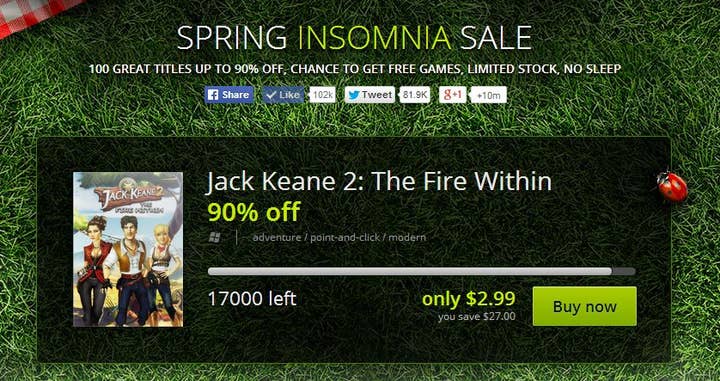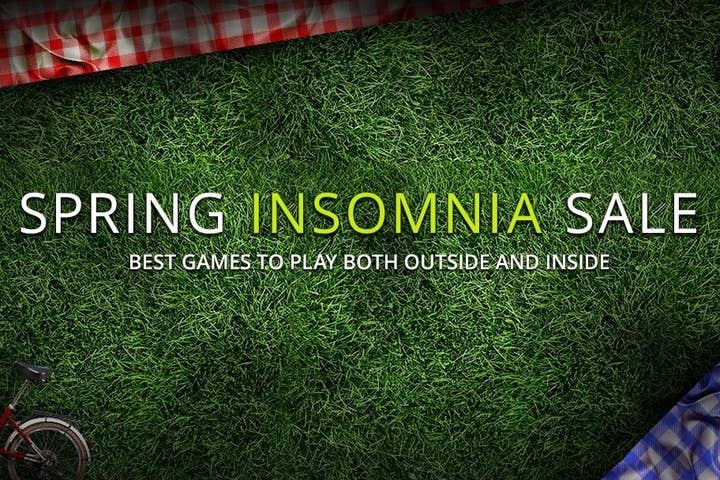The gamification of buying games
GOG's Insomnia Sale aims for addiction without adding to the race to the bottom for digital game prices
Last weekend, GOG wrapped up its second Insomnia Sale, a promotion where only one game is on sale at any given time. However, that game receives an unusually steep discount, and there are a limited number of copies that will be sold at that price. Once the predetermined number of games have been picked up (a number displayed to users and updated in real-time on the page), a new game takes its place in the promotion. Speaking with GamesIndustry International during the sale, GOG's VP of North America Guillaume Rambourg and VP of business development and operations Oleg Klapovsky explained the genesis of the idea.
"We are all gamers here, and we started thinking, 'What is the best way to make promos more entertaining and make them more similar to the games?' We were trying to think of some interesting mechanics that will look similar as a game. We basically created a game out of buying games," Klapovsky said.
"We were trying to think of some interesting mechanics that will look similar as a game. We basically created a game out of buying games."
Oleg Klapovsky
Rambourg added, "Obviously, we wanted to gamify the experience. On the other hand, we wanted to create a feeling of addiction. You check the counter in real time on the website, and it's kind of addictive. This was part of our thinking as well, how to keep people interested in GOG, or how to keep them interested behind their screens."
Klapovsky said the team had underestimated how popular the Insomnia promo would be. When they first tried it last year, they queued up a list of deals they figured would take customers maybe two weeks to burn through. Instead, they snatched up all the deals in just five days. And that's even with some games that struggled to sell through their allotted copies.
"There were some blockers we didn't expect," Klapovsky said. "I still remember the game Jack Keane 2, that appeared during the night European time, and it postponed the next game for six hours or so."
The GOG forums soon lit up with players frustrated by Jack Keane 2's continued presence as the lone discounted game. Rambourg said users began asking each other to buy copies just so they could cycle through to the next deal. Later on in the promo, Rambourg said the GOG team decidedly to lightly troll the fans, bringing Jack Keane 2 back in the rotation with an absurdly large allotment of discounted copies. That gag aside, Rambourg insisted they play fair with the counter. If a game stubbornly refuses to sell and brings the promo to a halt, then so be it.

"Honestly, I think it's part of the fun that some games might block the whole process," Rambourg said. "It's just like life. It's never black or white; it's always gray... Let's see what happens. People talk, they interact, they have fun with it. We don't see the promo as something that should be carefully scheduled, that should be totally smooth."
The good news for GOG is that bumps like that are just part of the entertainment value for those following along. The better news is that the Insomnia promos have been working. In the first 24 hours of the most recent sale, GOG saw 620,000 unique visitors come to check out the deals. About 90,000 games were sold in the first two days of the promotion, and in the first wave of titles, each game was only offered for an average of three minutes before all the copies were snapped up. Theme Park was the fastest seller, moving three copies a second for the brief time it was on sale.
And unlike ordinary deep discount promotions, GOG believes the model of the Insomnia sale helps avoid concerns about diminishing prices for digital games.
"We generally don't like the race to the bottom that was started recently by many platforms. Unfortunately, we are becoming part of this race ourselves."
Guillaume Rambourg
"We generally don't like the race to the bottom that was started recently by many platforms," Rambourg said. "Unfortunately, we are becoming part of this race ourselves. More and more platforms are running long-time high discounts that in my opinion are diminishing the value of games, especially in the long run. We think this mechanic of having a limited number of units with a crazy offer is a good thing because we are not diminishing the product's value in the long run, plus the developer or publisher has full control on how many units will be sold."
Though GOG only has about seven months of data to look through, they found that after the initial Insomnia promotion, the games involved generally received a boost to their daily unique sales totals that extended well beyond the sale period and through the following four months.
"We want to keep some magic," Rambourg said. "When you make something crazy like that regular, you kill some magic. We should use it from time to time, and that's it."
One consequence of the race to the bottom that concerns Rambourg is the effect of having so many people buying games that they never actually play.
"If we followed the trends of this industry, we would have crazy promos every day. Just look at the Humble Bundle, for example. They have crazy promos all the time. And we don't believe that's the right way to go."
Guillaume Rambourg
"What worries me is that in the long run, this could somehow kill the passion of gamers for games," Rambourg said. "People will stop having an emotional relationship with games, or a feeling of ownership. Maybe they will turn from gamers to consumers, and consumer is a word we hate at GOG...We try on purpose to have a limited amount of releases on the website, a limited amount of promos. If we followed the trends of this industry, we would have crazy promos every day. Just look at the Humble Bundle, for example. They have crazy promos all the time. And we don't believe that's the right way to go. We see GOG as a boutique somehow. We see it as a store where we curate the offers."
Rambourg said GOG received more than 1,000 submissions from developers last year, but the company tries to limit new releases to about 5 a week, roughly a quarter of the total submissions. The number of promotional offers are also limited, with maybe two or three games on sale in any given week (outside of seasonal event sales like the Insomnia promo). Cherry picking the best titles to offer gamers is part of what Rambourg sees as a "sustainable" approach to digital distribution.
"What we want to avoid is becoming another soulless storefront like the App Store, for example," Rambourg said. "If you're featured on the home page, that's great, you'll have tons of sales. And if you're nowhere on the home page, let's be honest, you'll make no sales. This is a crazy extreme situation. So instead, by being so selective, we're trying to give every game a chance to shine."

